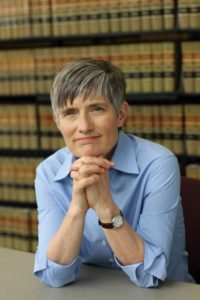*Special Location – Town Center, Wisconsin Institutes for Discovery, 330 N. Orchard St*
Meg Gaines – “The Center for Patient Partnerships”
November 14th, 7pm, Town Center, Wisconsin Institutes for Discovery, 330 N. Orchard

Martha E. (Meg) Gaines is a 1983 cum laude graduate of the University of Wisconsin Law School, where she received the Wisconsin Law Alumni Award for outstanding contribution to the community. After law school, Meg clerked for the late Judge Thomas Tang of the Ninth Circuit Court of Appeals in Phoenix, Arizona (1983), worked as a trial attorney for the Milwaukee office of the State Public Defender (1985-1987), and returned to the Law School’s Remington Center where she taught until becoming Assistant Dean for Student and Academic Affairs (1998-2000). Meg was the 1995 recipient of the campus-wide Chancellor’s Hilldale Award for Excellence in Teaching.
Meg received her B.A. in Religion in 1977 from Vassar College and her LL.M in 1993 from the University of Wisconsin Law School. Her master’s thesis is titled “I do make house calls–Effective Legal Representation From Our Clients’ Perspective.” Meg is on the faculty of the National Criminal Defense College in Macon, Georgia and the New York State Defender’s Association in Albany, New York.
In September 2000, Meg and several colleagues founded The Center for Patient Partnerships at the University of Wisconsin. Begun with generous pilot grants from alumna Linda B. Stern, ’61 and The Wallis Foundation, the Center trains students from the schools of Law, Medicine, Nursing, Pharmacy and Social Work to provide advocacy to cancer patients. In collaboration with colleagues from those departments, Meg teaches a Patient Advocacy course where students are joined in interdisciplinary teams that help cancer patients understand their diagnoses, get the information necessary to make critical treatment decisions, and support patient’s efforts to get the treatment they need.
The Center also conducts research about issues relevant to patient care and health care delivery – from the patient’s perspective. The Center is a national model of excellence in the education of health care and legal professionals.
Meg Gaines started her talk tonight by describing herself as a ‘transplant’, otherwise referring to the fact that she is not originally from Wisconsin. Because of this, she was curious to see what was so Wisconsin about the Wisconsin Idea. I think this is something we have talked about a lot in our discussions, and it’s hard to pinpoint. Is it the ‘hard work’ and ‘grit’ that is so entwined in many parts of Wisconsin culture? Or is it the individuals from UW who fostered the creation of the Wisconsin Idea – McCarthy, Van Hise, LaFollette, and many more? I’m not sure if the talk by Meg made this question any clearer to me, but I’m not sure if there is a clear answer to this question either.
The focus of Meg’s talk was about how the people of Wisconsin can benefit the University, rather than the normative way to think about the Wisconsin Idea, which is ‘How can the University help the citizens of Wisconsin?’. She delved deeper into this focus after sharing a brief summary of the start of the Wisconsin Idea. Her examples of how citizens of Wisconsin are able to benefit the University were based around the Center for Patient Partnerships, an entity that she founded after her diagnosis with ovarian cancer. She soon found that her voice was not heard in her healthcare experiences, and that she was not valued in the interactions she shared. We all hear about interdisciplinary initiatives in healthcare, but Meg posits that true teamwork is rarely seen in healthcare.
Because of this, the goal of the Center for Patient Partnerships was to provide a space where patients could be a part of the interdisciplinary team and trained in order to be effective. The overall goal of this program is improving health outcomes for the patients or clients seeking help, but it also gives a unique opportunity to graduate students. Students pursuing a professional degree in healthcare are able to strengthen their skills as a patient advocate. Meg shares that the students work to create an experience where the patients and clients are able to find, in their own experiences, skills that they can apply to their healthcare experience to improve their outcomes. They also work with insurance issues, and help patients talk with their employers about the nature of their ailment and how it may affect their work.
My favorite part of Meg’s talk was her mention of the Resource Navigator program. I interviewed to be a volunteer in this program and was super interested as I am going into a ‘helping’ field. Unfortunately, my schedule did not align with the volunteer shifts so I was unable to pursue the opportunity, but I did have a chance to learn from current volunteers and graduate students involved in the program. This is a great example of a preventative and proactive measure that improves the lives of both students and patients.
Finally, the message that Meg Gaines leaves us with is one that she reiterated throughout her talk. See clients and patients as the experts that they are. Patients and physicians are partners, and listening is essential to their partnership. When I think about how this talk related to the Wisconsin Idea, I think Meg allowed us to approach the Wisconsin Idea from a different angle. While we spend much of our time thinking about how the University is able to help citizens, Meg allowed us to view this from an opposite angle.